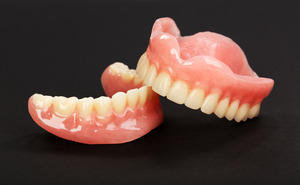No comments yet.
RSS feed for comments on this post.
Sorry, the comment form is closed at this time.

The idea of going through life without teeth is a thoroughly unpleasant one, which is why so many people turn to dentures to help them eat their favorite foods, speak with clarity, and smile with confidence. But what if you wait too long to get them? When teeth have been lost, the bone in your jaw is gradually resorbed. If too much bone is lost, will it be an obstacle to getting dentures? Your dentist is here with the answer.
Your jawbone might seem strong and sturdy on its own, but the fact is that it relies on stimulation from your teeth. If said stimulation no longer occurs because teeth are missing, the now “unneeded” parts of the jawbone will start to atrophy. Most of the deterioration will happen within the first 12 or 18 months after the initial tooth loss. As such, it is highly recommended that you decide on the method of tooth replacement you want to pursue as soon as possible.
The good news is that even individuals that have already experienced bone loss in their jaws can still be eligible for dentures. Your dentist can determine whether you’re a candidate for the treatment by taking a close look at your jawbone and considering your overall oral health.
Generally speaking, bone loss is more likely to affect your ability to get full dentures as opposed to partial dentures. This is due to the different methods they use to stay in place in your mouth. Full dentures sit on your gums and thus are more dependent on the jawbone for support; partial dentures, on the other hand, are anchored to your natural teeth via clasps.
Even if you are currently unable to get dentures due to bone loss, that doesn’t mean you have to give up on the treatment. A bone grafting procedure can restore bone density to any deteriorated areas. This helps strengthen the jaw to the point where dentures can be used.
Different tooth replacement methods might be recommended based on the specifics of your situation. Dentures are likely to be a good choice if you’re missing many or all of the teeth in one or both arches. Of course, you shouldn’t make any decisions without first speaking to a qualified dental professional. If you schedule a consultation with your dentist, they can explain the pros and cons of dentures to help you decide whether they’re truly the best way to regain a complete smile.
Dr. Albert Silvera went to the UCLA School of Dentistry for his dental doctorate. He has been in the dental field for over 20 years, and he’s proud of the work he does. If you’re missing multiple teeth, he’s likely to recommend beautiful, highly durable dentures as a solution. To schedule a consultation with Dr. Silvera at Rancho Park Dental Group in Los Angeles, visit his website or call (310) 575-0886.